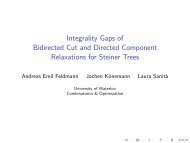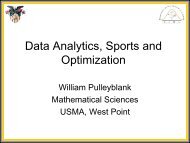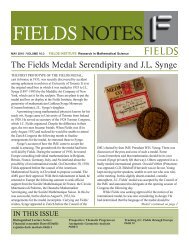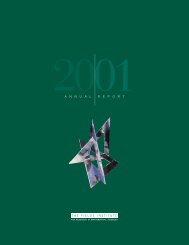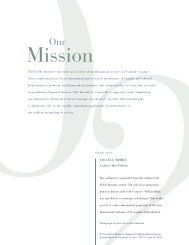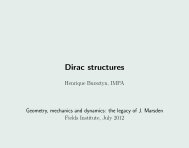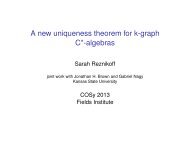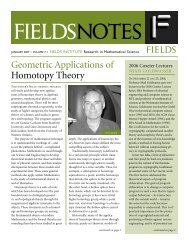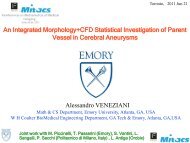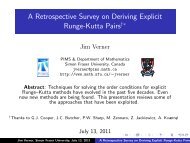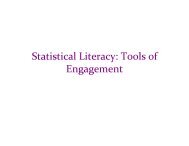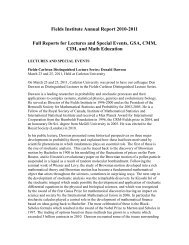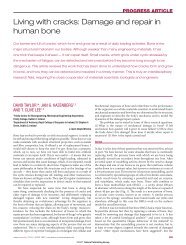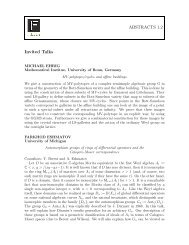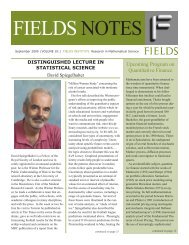Annual Report 2005 - Fields Institute - University of Toronto
Annual Report 2005 - Fields Institute - University of Toronto
Annual Report 2005 - Fields Institute - University of Toronto
You also want an ePaper? Increase the reach of your titles
YUMPU automatically turns print PDFs into web optimized ePapers that Google loves.
Scientific Advisory Panel 2004–<strong>2005</strong><br />
The Scientific Advisory Panel (SAP) provides the scientific<br />
leadership <strong>of</strong> the <strong>Institute</strong>. The SAP, which is chaired by<br />
the Director, includes the Deputy Director and a rotating<br />
membership <strong>of</strong> at least seven distinguished mathematicians<br />
from Canada and abroad. The panel makes recommendations<br />
to the Board <strong>of</strong> Directors on the selection <strong>of</strong> thematic<br />
programs and other major activity<br />
JENNIFER CHAYES is Manager <strong>of</strong> the Theory Group at<br />
Micros<strong>of</strong>t Research. The group includes mathematicians,<br />
physicists and theoretical computer scientists working on<br />
problems at the interface <strong>of</strong> these three fields. In addition<br />
to managing the Theory Group at Micros<strong>of</strong>t, Chayes has<br />
been Pr<strong>of</strong>essor <strong>of</strong> Mathematics at UCLA and is Affiliate<br />
Pr<strong>of</strong>essor <strong>of</strong> Mathematics and Physics at the <strong>University</strong> <strong>of</strong><br />
Washington. She has been Vice-President <strong>of</strong> the American<br />
Mathematical Society. Chayes has also served on numerous<br />
other boards and advisory committees. Chayes received<br />
her BA in biology and physics from Wesleyan <strong>University</strong>,<br />
where she graduated first in her class. She received her PhD<br />
in mathematical physics from Princeton <strong>University</strong>. She<br />
was a postdoctoral fellow in the Physics and Mathematics<br />
departments at Harvard <strong>University</strong>, and at the Laboratory<br />
<strong>of</strong> Atomic and Solid State Physics and the Army Mathematics<br />
Center at Cornell <strong>University</strong>. Chayes was awarded a<br />
National Science Foundation Postdoctoral Fellowship in<br />
Mathematics and a Sloan Foundation Fellowship. She has<br />
also won several teaching awards including the Distinguished<br />
Teaching Award in Mathematics at UCLA. She has<br />
twice been a member <strong>of</strong> the <strong>Institute</strong> for Advanced Study in<br />
Princeton. Chayes is the author <strong>of</strong> over sixty-five papers in<br />
mathematics and physics. She is one <strong>of</strong> the world’s experts<br />
on phase transitions, particularly on the probabilistic and<br />
stochastic geometric approach to statistical physics. Since<br />
joining Micros<strong>of</strong>t in 1997, Chayes has begun to apply<br />
methods from mathematics and physics to problems in<br />
theoretical computer science, networking, and information<br />
technology.<br />
WALTER CRAIG received his MS and PhD from the Courant<br />
<strong>Institute</strong> <strong>of</strong> Mathematical Sciences, New York <strong>University</strong>.<br />
His research focuses on the theory <strong>of</strong> nonlinear partial<br />
differential equations and Hamiltonian dynamical systems,<br />
and their applications. He has taught at Caltech,<br />
Stanford <strong>University</strong>, and Brown <strong>University</strong>, and is currently<br />
Pr<strong>of</strong>essor <strong>of</strong> Mathematics and Canada Research Chair<br />
at McMaster <strong>University</strong>. He has lectured extensively at<br />
G o v e r n a n c e<br />
conferences and institutes around the world, including<br />
the Tata <strong>Institute</strong>, the ICMS Edinburgh, the ETH, the INI,<br />
and IHES. He is currently on the Council <strong>of</strong> the AMS, and<br />
is a member <strong>of</strong> the editorial boards <strong>of</strong> the SIAM Journal<br />
on Mathematical Analysis, the AMS Graduate Studies,<br />
the Proceedings <strong>of</strong> the Royal Society, the Canadian Journal<br />
<strong>of</strong> Mathematics, and the Mathematical Physics Electronic<br />
Journal. He helped organize the <strong>Institute</strong>’s 2003 thematic<br />
program in Partial Differential Equations.<br />
HENRI DARMON received his BSc in Mathematics and<br />
Computer Science from McGill <strong>University</strong> in 1987 and his<br />
PhD in Mathematics from Harvard <strong>University</strong> in 1991. He<br />
is currently Pr<strong>of</strong>essor in the Department <strong>of</strong> Mathematics<br />
at McGill <strong>University</strong>. Prior to his present appointment he<br />
taught at Princeton <strong>University</strong>. He has received a Sloan<br />
Doctoral Dissertation Fellowship, an Alfred P. Sloan<br />
Research Award, the G. De B. Robinson Award, the Coxeter-James<br />
Prize <strong>of</strong> the Canadian Mathematical Society,<br />
the CRM’s André Aisenstadt Prize, NSERC’s E.W.R. Steacie<br />
Memorial Fellowship, and the Ribenboim Prize <strong>of</strong> the<br />
Canadian Number Theory Association. He was elected a<br />
fellow <strong>of</strong> the Royal Society <strong>of</strong> Canada in 2003. Darmon is<br />
currently editor-in-chief (with Niky Kamran) <strong>of</strong> the Canadian<br />
Journal <strong>of</strong> Mathematics and has served on the editorial<br />
boards <strong>of</strong> the International Journal <strong>of</strong> Number Theory,<br />
Commentari Mathematici Helvetici, the Journal <strong>of</strong> Number<br />
Theory, and the Annales des Sciences Mathématiques du<br />
Quebec. He is a member <strong>of</strong> NSERC’s Grant Selection Committee<br />
and <strong>of</strong> the CMS prize committee. His main research<br />
interests are in p-adic analysis and the theory <strong>of</strong> automorphic<br />
forms with special emphasis on elliptic curves and<br />
explicit class field theory.<br />
KENNETH R. DAVIDSON received his undergraduate degree<br />
at the <strong>University</strong> <strong>of</strong> Waterloo in 1972 and his PhD from the<br />
<strong>University</strong> <strong>of</strong> California at Berkeley in 1976. He was a C.L.E.<br />
Moore instructor at M.I.T. for two years before moving to<br />
the <strong>University</strong> <strong>of</strong> Waterloo in 1978. His research interests<br />
are in operator theory and operator algebras, and he won<br />
the Israel Halperin prize in this area in 1985. He was an<br />
E.W.R. Steacie fellow 1988-90 and a Killam Research Fellow<br />
1995-97. He was elected a fellow <strong>of</strong> the Royal Society <strong>of</strong><br />
Canada in 1992. He has been on the editorial boards <strong>of</strong> various<br />
journals including the CMS journals and is an editor<br />
<strong>of</strong> the Journal <strong>of</strong> Operator Theory. He has served the CMS<br />
in various capacities including Vice-President (Ontario) in<br />
1995-97. He sat on the NSERC mathematics GSC in 1990-<br />
<strong>Fields</strong> <strong>Institute</strong> <strong>2005</strong> ANNUAL REPORT 125



